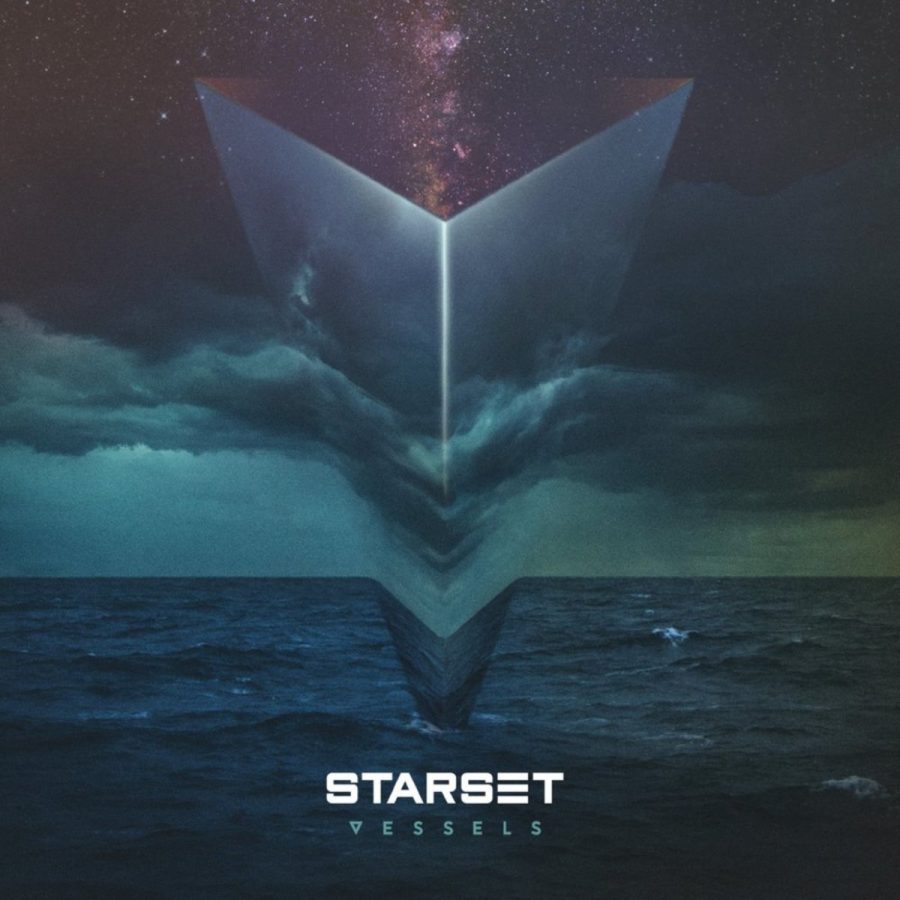By Liz Keller ’17, Arts and Entertainment Editor
In the past ten years, music has seen some great concept albums such as My Chemical Romance’s Danger Days: The True Lives of the Fabulous Killjoys and Black Veil Brides’ Wretched and Divine: The Story of the Wild Ones. Taking this concept and turning it up to 11 is Columbus, Ohio’s Starset. This band combines their concept (that they are distributing messages obtained from a mysterious signal in space) with a diverse musical sound that merges metal, pop, electronics, and orchestral strings into an interesting and unique sound. The band consists of singer/keyboardist/soundboardist Dustin Bates, bassist/keyboardist/backing vocalist Ron DeChant, guitarist/backing vocalist Brock Richards, and drummer Adam Gilbert. The saving grace of January 20th was the release of their second album, Vessels, on Razor and Tie Records.
Similarly to many other concept albums, Vessels starts with a lyricless intro. This one is called “The Order” and imparts an ominous feeling on the listener. The vague, unintelligible words in the background tune in the listener to the space message Starset will share. “The Order” leads seamlessly into “Satellite” in a way that would confuse the listener if they were listening on shuffle or heard the song on the radio. The catchy, upbeat song draws the listener in with a strong beat before dropping into an almost rhythmless verse. It then becomes extremely fast-paced and leaves the listener thinking of the satellite that binds them. Differing from their first album, the song ends with more instrumentals instead of a mildly confusing yet interesting discussion of astronomy and astrophysics. Their last album, Transmissions, was designed to make you think, but Vessels is designed to make you feel. “Frequency” is another love song which is probably the song on the album which is most likely to get stuck in your head. It is very easily accessible to all listeners and the beginning leans more heavily on pop and electronic, drawing the listener in before becoming a bit heavier and returning to Starset’s rock roots. At the end of the song, singer Dustin Bates breaks into unclean vocals, which discuss the true complexity of love. However, “Frequency” differs from “Satellite” by talking more about the vulnerability and pain that love can bring. The song ends with the static mentioned in the song and the vague sounds of a heart monitor.
“Die For You” is much slower than the first three songs on the album, and is much more stripped down with less use of the soundboard, aside from some vocal effects. However, it picks up some complexity from the masterful use of orchestral strings. “Die For You” is a heart-wrenching ode to a lover, and almost a plea to return. The song ends with a full minute of strings that conveys an almost hopeless feeling with the flat notes. “Ricochet” begins on a very different note, with a much greater use of the soundboard until the chorus, which is much softer. Following the progression of the album, “Ricochet” is the memory of a love now lost. The end of the song picks up into a desperate, and slightly angry version of the beginning that begs for help and laments loss. This song ends as well ends with a minute of instrumentals, beginning with angry orchestral strings then ending with soft and purposefully-glitchy sounding keyboard notes. “Starlight” is a song that invokes the principle of a soulmate. It is very upbeat and the drum line is reminiscent of a marching band. This song continues the love story, but talks about how the narrator would do almost anything to see the love he has lost again. “Starlight” is a refusal to back down and give in; he will do anything to see his love again and not even a thousand armies could stop him.
The next section of the album describes the journey or fight to find a lost love. “Into the Unknown” sounds more like a heavy rock song than any previously on the album. Multiple times throughout the song, Dustin Bates just stops on the edge of a scream before breaking through at the beginning of the first verse. The song outlines his journey, that he is about to depart on, like a plot summary of the Odyssey. “Gravity of You” is about the pull the narrator feels to his love. Though it starts out on a more upbeat note, it spirals darker, breaking out into more unclean vocals. Then it lightens up as the narrator remembers what he is fighting for. The song’s outro features more of a beat with vague whispers heard in the background and some creepy repeating notes. “Back To The Earth” starts out with a lot more soundboard and heavier instruments as the narrator seemingly gives up his quest. The long string of fallings easily mimics the sound of someone’s scream fading as they fall out of sight. The end of the song picks up with more strings and provides a sense of hope which the beginning of the song had destroyed. “Last To Fall” sounds much more simple and radio-ready than the prior heavy-hitting songs. However, that illusion is destroyed as the song enters the chorus which is simply “The Last to Fall” repeated. While the verses are upbeat and lighter, every chorus features Bates on the edge of a scream. The song ends with a minute-and-a-half long instrumental, which is just like the build in any action movie that warns something is about to happen next.
The next part of Vessels covers the monsters inside ourselves and the struggles of dealing with mental illness. “Bringing It Down” starts with a Halloween-esque succession of keyboard notes which are thoroughly creepy. In the background is the creepy music which usually lets you know that something is about to happen in a horror movie. Once the narrator realizes that the creature is inside of him, the vocals break into the anguished scream that they had just been edging on earlier. The narrator has now become a monster. “Unbecoming” copes with and accepts what has happened in “Bringing It Down”, even though the narrator succumbs to it in the end. The title itself reminds me of the annoying standards that society sets and that people who deal with mental illness are shunned by the collective and hidden away. The song becomes progressively angrier and harder as it continues, as the narrator realizes there is truly no escape from what he has become. “Monster” deals with the desperate desire to cut away the part of oneself that has become ‘diseased’, to be healed and return to normal. “Monster” is easily one of the catchiest songs on the album and could easily be heard on a rock radio station. It borders just on the edge of too heavy for most people, but brings it back down during the third verse when it lightens up. As with many songs, the end of the song contrasts the dark lyrics and more upbeat instruments in order to avoid being too dark.
During “Telepathic”, the narrator realizes that the one he loves is the one who has made him into this monster. The electronics are perfectly balanced with the instruments and the short sentences of the lyrics make this the song you wave your hands back and forth to in the air during a concert with your lighters or phone flashlights out. During the song, the narrator stops blaming himself and accepts himself for who he is, not being ashamed for the first time since he realized what he was. The outro of the song is radically different from its body; it becomes a slow and somber piece because the narrator must abandon the person who made him the way he is. “Everglow” is the slowest song on the album and features more use of the soundboard than instruments. It is a sad goodbye to the person the narrator once loved. After four and a half minutes of a slow tempo it unexpectedly picks up as if the narrator is destroying the person he once loved in order to save himself. The outro is just like a movie ending: the little bit of happiness after a dark, gritty ending, and the triumph and promise of a new adventure to come.






